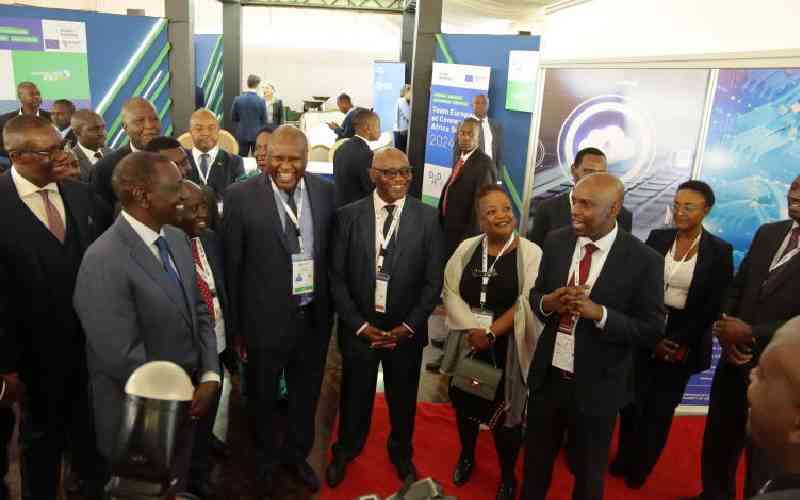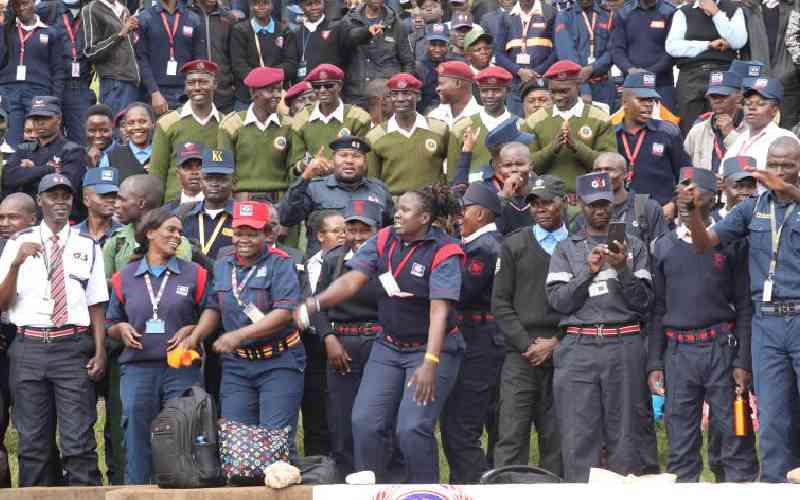NAIROBI, KENYA: Police boss David Kimaiyo has warned VIPs against diverting Government provided bodyguards to unofficial duties saying it risks their own security.
Kimaiyo also warned bodyguards against being used to run unofficial errands for the VIPs and declared those found will be disciplined.
“I have instructed all bodyguards to observe due diligence of their respective VIPs and desist from performing other duties rather than VIP protection,” he said.
He added there have been complaints that the bodyguards are at times used as messengers, which is against the law.
The police boss said there however must be a strong bond between the protector and protectee so that there can be no security lapse.
He made the remarks in the wake of concerns over the security of VIPs and threats from various parties. Kimaiyo made the remarks in a statement read by his spokesperson Gatiri Mboroki. He revealed that over 6,000 police officers wake up daily to protect VIPs.
He however insisted contrary to perception, the number of those in need of protection is not overwhelming.
Police are supposed to protect commissioners of Constitutional Commissions, Members of Parliament, Cabinet Secretaries and Principal Secretaries.
Police also guard the President, Deputy President, Speakers of National Assembly, governors, senators and few “select leaders” and vital installations.
A team that was headed by Kenya airways CEO Titus Naikuni proposed that the officers be released to undertake their core responsibilities to avoid situations where many policemen are underutilized by being deployed to work for a few VIPs at the expense of Kenyans.
The team said there lacked a clear policy on who was entitled to VIP protection.
It said the level of entitlement had created a situation where a large number of police officers were engaged on "VIP" protection at the expense of core police duties.
Some policemen are also deployed to some of these VIPs as their drivers.
The Chief Justice, Central Bank Governor, the Speaker of the National Assembly, IG, his deputies, the Chief of Defence Forces are also in the league of the fortified.
These public officers each have a chase car, at least five guards, and another division protecting their spouses and children.
Stay informed. Subscribe to our newsletter
An unspecified number of influential personalities, former Cabinet members, and retired public servants also have police guards – because of risks posed by decisions they made and information they accessed while in office.
This is apart from the administration policemen assigned at every level of the provincial administration such as provincial and district commissioners.
Those in the top hierarchy of the police are also assigned bodyguards some of whom double up as their drivers.
The number of policemen assigned on non-core duties has been further exacerbated by the creation of several constitutional commissions, offices and County Commissioners each of whom is assigned at least one bodyguard and or driver.
Some private institutions such as banks, co-operative societies, private businesses and even private homes have also been provided with policemen for guard duty.
Currently, the deployment of police security is haphazard as some ministers or even MPs have more policemen in their entourage than their colleagues.
The team recommended that the government consider using private security firms and the National Youth Service for non-core police duties.
 The Standard Group Plc is a
multi-media organization with investments in media platforms spanning newspaper
print operations, television, radio broadcasting, digital and online services. The
Standard Group is recognized as a leading multi-media house in Kenya with a key
influence in matters of national and international interest.
The Standard Group Plc is a
multi-media organization with investments in media platforms spanning newspaper
print operations, television, radio broadcasting, digital and online services. The
Standard Group is recognized as a leading multi-media house in Kenya with a key
influence in matters of national and international interest.
 The Standard Group Plc is a
multi-media organization with investments in media platforms spanning newspaper
print operations, television, radio broadcasting, digital and online services. The
Standard Group is recognized as a leading multi-media house in Kenya with a key
influence in matters of national and international interest.
The Standard Group Plc is a
multi-media organization with investments in media platforms spanning newspaper
print operations, television, radio broadcasting, digital and online services. The
Standard Group is recognized as a leading multi-media house in Kenya with a key
influence in matters of national and international interest.








